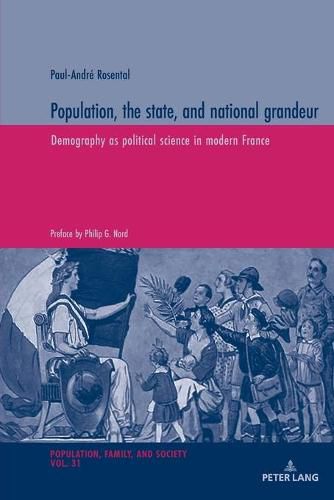Readings Newsletter
Become a Readings Member to make your shopping experience even easier.
Sign in or sign up for free!
You’re not far away from qualifying for FREE standard shipping within Australia
You’ve qualified for FREE standard shipping within Australia
The cart is loading…






This title is printed to order. This book may have been self-published. If so, we cannot guarantee the quality of the content. In the main most books will have gone through the editing process however some may not. We therefore suggest that you be aware of this before ordering this book. If in doubt check either the author or publisher’s details as we are unable to accept any returns unless they are faulty. Please contact us if you have any questions.
Only in France is demography essentially the population science: it is taught at school, newspapers feature the evolution of fertility rates in their headlines and the subject sparks ideological debates in the media. How did demography become a national identity issue?
The French exception is attributable to a political history that reached fulcrums during the Second World War under the racist Vichy regime and then after the Liberation, with the development of population policies and the creation of the French National Institute for Demographic Studies (INED). The book is the first to retrace its controversial genesis and analyze its ramifications for the following decades. It shows how theories, institutions and demographic policies developed simultaneously in France. Its reflection on the links between ideologies, science and the state offers a model that could be applied to the history of many other scientific disciplines.
Paul-Andre Rosental’s indispensable study examines the emergence of demography as an autonomous discipline and its association with the state in mid-twentieth-century France. Demography’s success in the immediate post-war years came in part from its dual concern with both science and action, which allowed policy makers to claim both knowledge and expertise in addressing social problems. Rosental’s measured tone hides a provocative argument that should serve as both a model and a foil for others working in the history of the human sciences.
Joshua Cole, University of Michigan.
$9.00 standard shipping within Australia
FREE standard shipping within Australia for orders over $100.00
Express & International shipping calculated at checkout
This title is printed to order. This book may have been self-published. If so, we cannot guarantee the quality of the content. In the main most books will have gone through the editing process however some may not. We therefore suggest that you be aware of this before ordering this book. If in doubt check either the author or publisher’s details as we are unable to accept any returns unless they are faulty. Please contact us if you have any questions.
Only in France is demography essentially the population science: it is taught at school, newspapers feature the evolution of fertility rates in their headlines and the subject sparks ideological debates in the media. How did demography become a national identity issue?
The French exception is attributable to a political history that reached fulcrums during the Second World War under the racist Vichy regime and then after the Liberation, with the development of population policies and the creation of the French National Institute for Demographic Studies (INED). The book is the first to retrace its controversial genesis and analyze its ramifications for the following decades. It shows how theories, institutions and demographic policies developed simultaneously in France. Its reflection on the links between ideologies, science and the state offers a model that could be applied to the history of many other scientific disciplines.
Paul-Andre Rosental’s indispensable study examines the emergence of demography as an autonomous discipline and its association with the state in mid-twentieth-century France. Demography’s success in the immediate post-war years came in part from its dual concern with both science and action, which allowed policy makers to claim both knowledge and expertise in addressing social problems. Rosental’s measured tone hides a provocative argument that should serve as both a model and a foil for others working in the history of the human sciences.
Joshua Cole, University of Michigan.